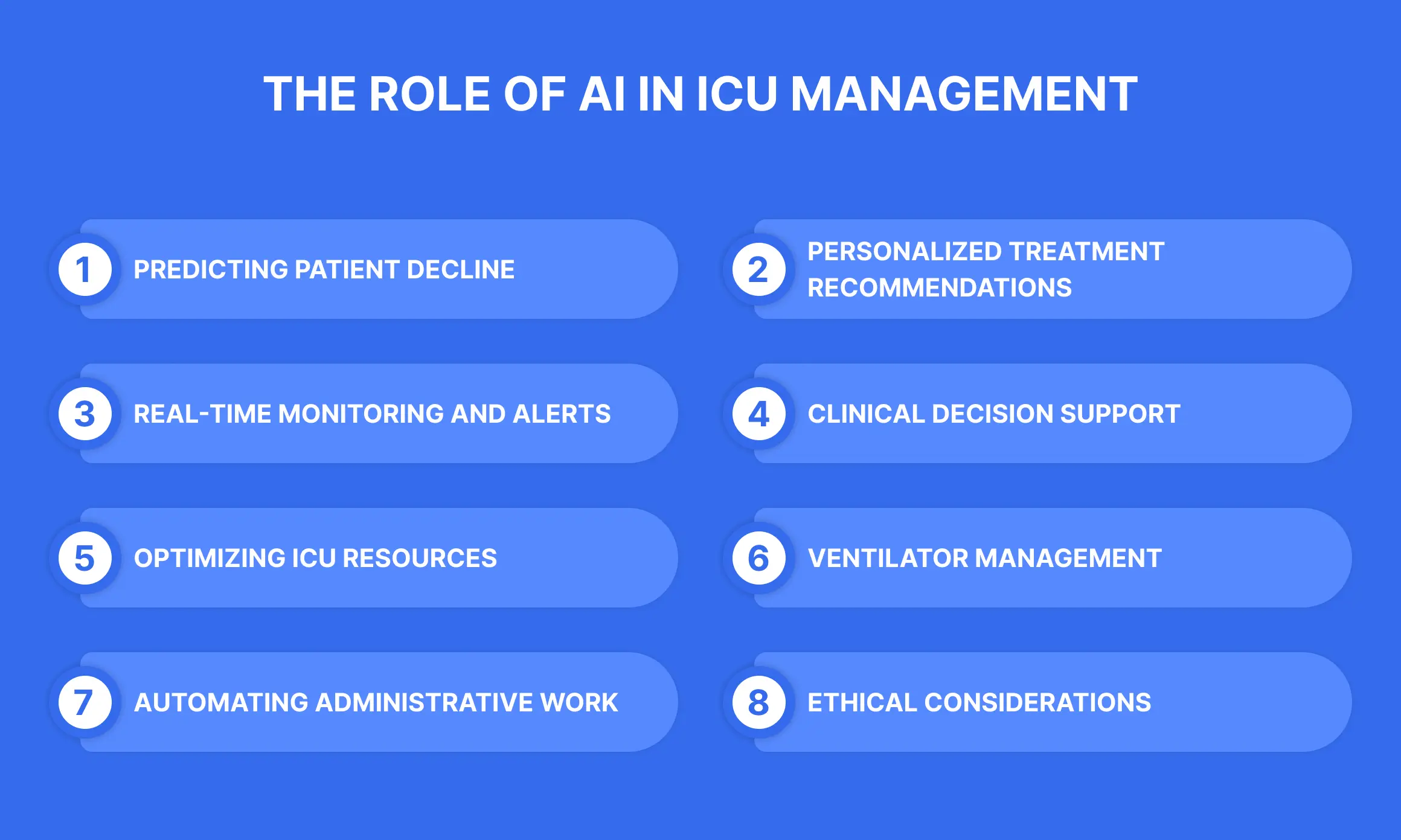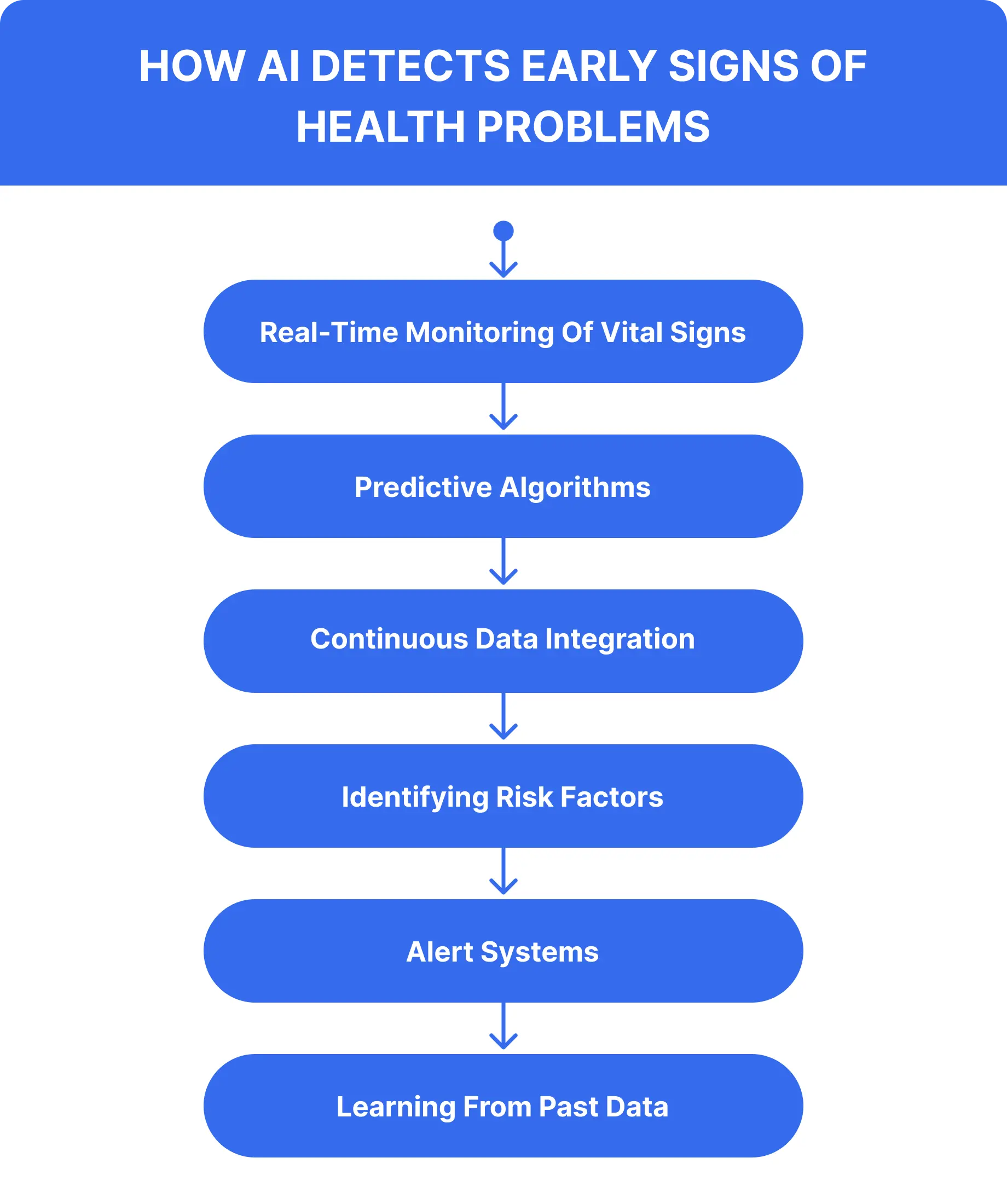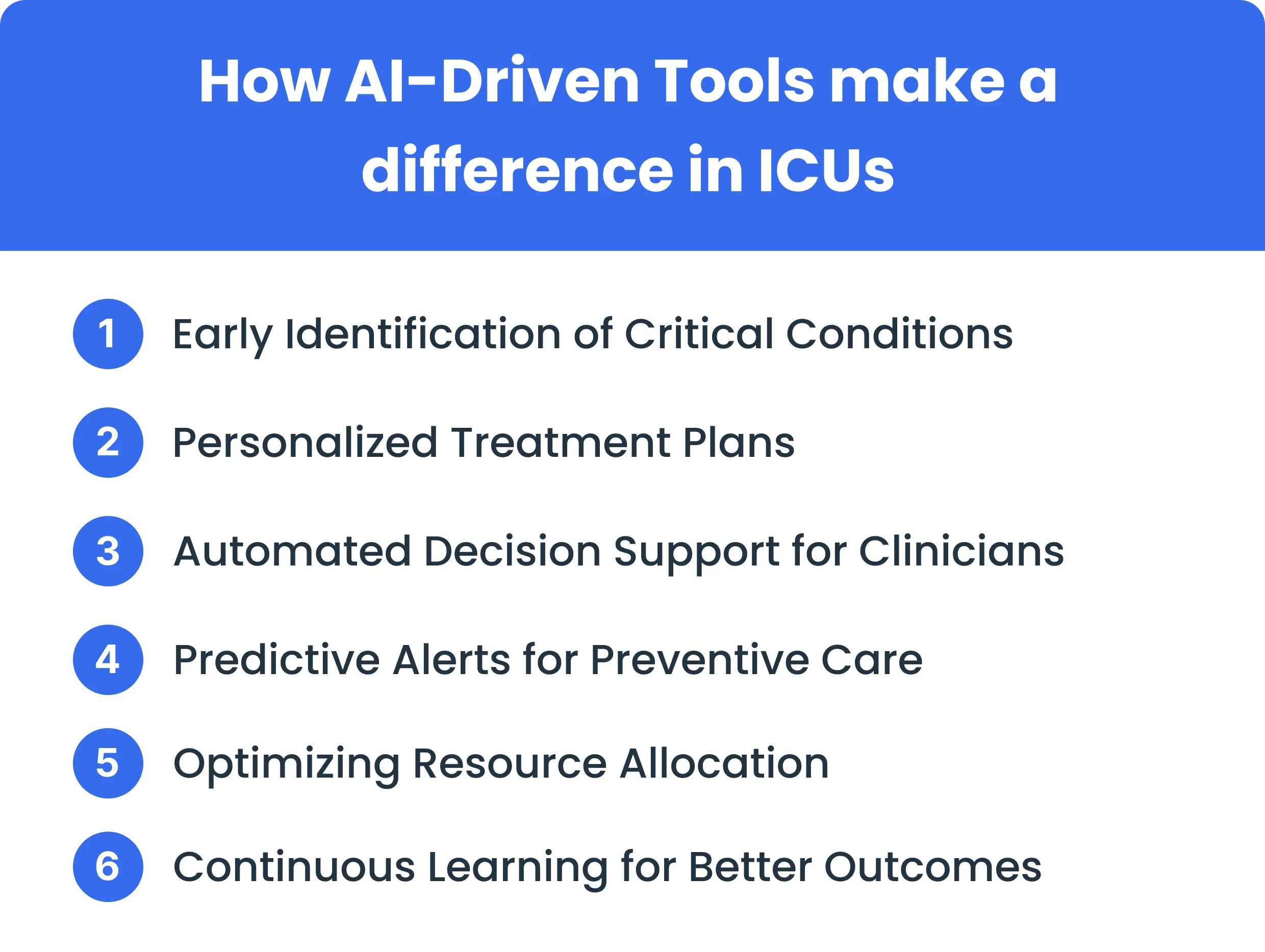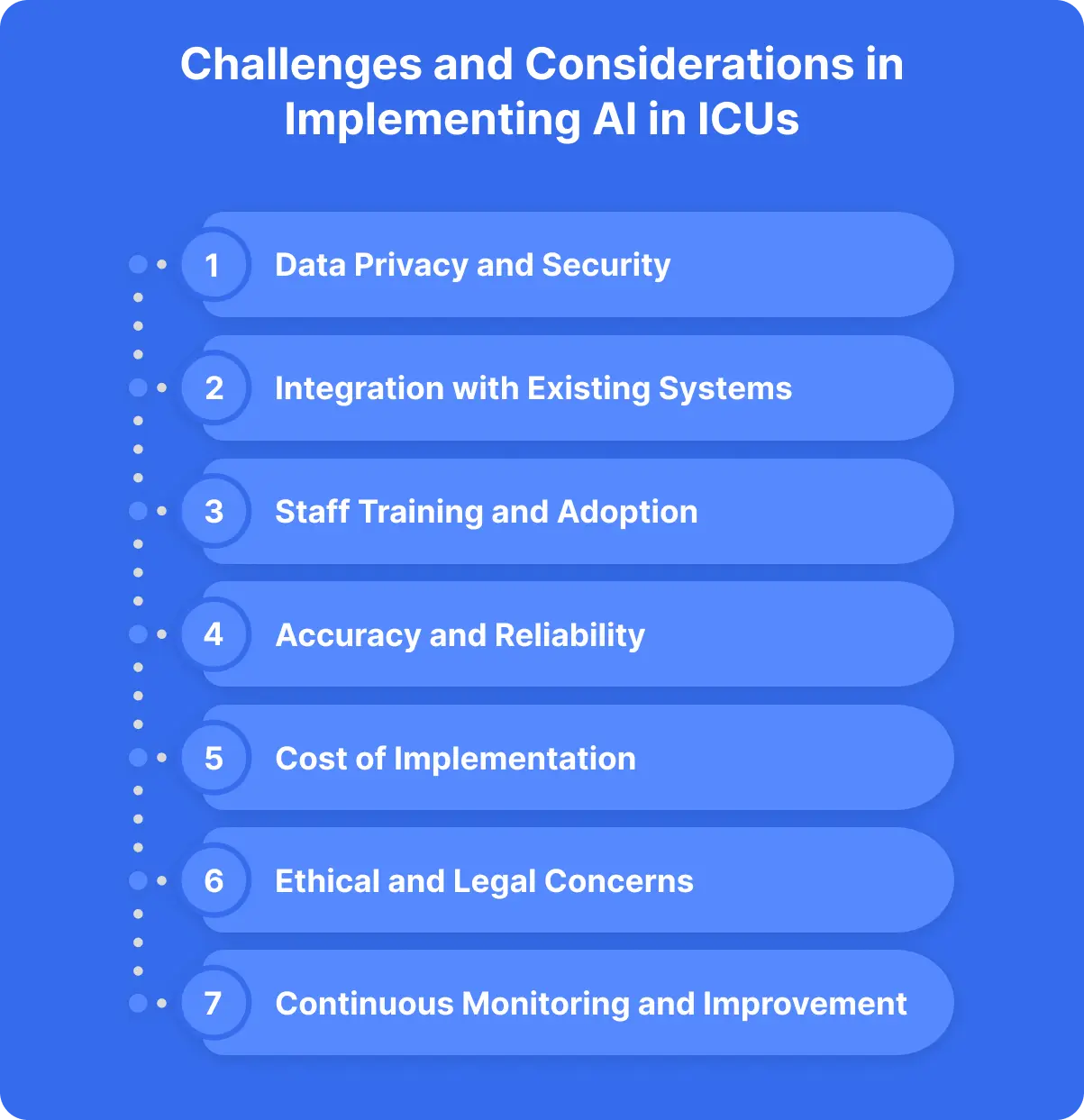Discover how AI is transforming ICU care with real-time monitoring, early detection of critical conditions, and personalized treatment plans. Learn how AI improves patient outcomes and optimizes ICU resources.

In the high-pressure world of ICU care, every second counts. What if technology could help doctors spot life-threatening changes in a patient’s condition before they become visible? AI in ICU management is making that possible. By analyzing patient data in real-time, AI tools can detect early signs of deterioration, allowing healthcare teams to intervene faster and improve patient outcomes.
As AI continues to evolve, its impact on critical care is becoming more transformative. These intelligent systems not only support faster decision-making but also provide actionable insights to guide treatment decisions. In this blog, we’ll explore how AI is transforming ICU care, enhancing early detection, and saving lives.

AI in ICU management can spot early signs of a patient’s condition getting worse by analyzing real-time data. This helps doctors act quickly before things get worse and improves patient outcomes.
AI tools analyze patient data to suggest customized treatment plans, including medications and therapy options, making ICU care more precise and effective.
AI for patient monitoring in the ICU ensures continuous tracking of vital signs. AI systems alert healthcare teams when abnormal patterns are detected, enabling quicker responses to critical situations.
AI-driven systems assist clinicians by providing evidence-based recommendations, helping them make informed decisions for critically ill patients.
AI can predict the demand for ICU resources like beds, ventilators, and staff. By assessing patient needs, AI helps hospitals allocate resources more effectively, ensuring that patients receive appropriate care at the right time.
AI enhances ventilator settings in real-time, improving ventilation, reducing lung injury risks, and speeding up recovery in ICU patients with respiratory issues.
AI automates routine tasks such as documentation and patient intake, allowing ICU staff to focus more on patient care and reducing administrative burdens.
As AI plays a significant role in ICU management, it’s important to address concerns around data privacy, decision transparency, and maintaining human control.
AI systems in ICU management use advanced algorithms to continuously monitor patient data and detect early signs of health problems. Here’s how it works:

AI analyzes data from devices that track heart rate, blood pressure, oxygen levels, and temperature. By identifying small changes, AI can detect issues before visible symptoms appear, enabling faster actions.
AI uses predictive models trained on historical and real-time data to recognize changes in patient health. These models can predict when a patient’s condition might worsen, such as detecting the early signs of respiratory failure or heart problems.
AI doesn’t depend on just one data type. It integrates multiple sources of information, including lab results, imaging, and electronic health records. This comprehensive data processing helps AI spot potential problems early.
AI algorithms assess patient risk factors, such as age, medical history, and underlying conditions. This enables AI to predict complications like infections, organ failure, or infections before they become critical.
When AI detects abnormal patterns, it triggers real-time alerts to ICU staff, enabling them to respond faster. These alerts can be customized to match the seriousness of the issue, allowing for timely actions and reducing the chances of worsening health problems.
AI improves over time by continuously learning from past patient outcomes. As it processes more data, it becomes better at predicting which early signs are most critical for each patient, enhancing its ability to prevent serious complications.

AI has the ability to detect early signs of problems across different contexts, preventing larger issues before they grow. This is how it operates:
Pattern Recognition: AI analyzes vast amounts of data to identify patterns or irregularities that could indicate an emerging issue.
Real-Time Monitoring: AI systems continuously monitor activities and conditions, providing real-time alerts when something goes wrong.
Predictive Analysis: By analyzing past data, AI predicts potential problems, allowing preventive measures to be taken.
Enhanced Accuracy: AI can often detect minor changes that may go unnoticed by humans, leading to faster and more accurate identification of problems.
In healthcare, AI monitors patient’s vital signs, such as heart rate, temperature, or blood pressure, to identify early signs of health issues like heart attacks or strokes. In manufacturing, AI can observe machinery performance, flagging small changes or irregularities that could indicate potential failure.
By catching these small warning signs early, AI helps businesses and individuals save time, reduce costs, and prevent damage from larger issues. It’s like having a personal assistant who can predict problems before they happen, making sure everything stays on track.
AI in ICU management enhances patient care by enabling more accurate, timely, and effective actions. Here’s how AI-driven tools make a difference in ICUs:

AI systems analyze patient data in real time, spotting early signs of critical health issues. For example, AI detects changes in heart rate or oxygen levels, allowing healthcare providers to act before problems worsen.
AI helps create personalized treatment plans for patients by considering their medical history, genetic details, and current health data. This ensures that patients receive the most effective care, improving their chances of recovery.
AI-powered systems assist ICU staff by providing real-time recommendations based on patient data. These systems suggest treatment options, assist with medication dosages, and warn staff about potential risks, improving decision-making and reducing errors.
AI predicts possible complications before they occur, enabling ICU teams to take preventive measures. For example, AI can predict the chance of infection or organ failure, helping clinicians start treatments earlier.
AI helps optimize the use of ICU resources, such as staffing and equipment. By predicting patient needs and potential complications, AI allows hospitals to allocate resources more efficiently, ensuring that care is provided to the right patient at the right time.
AI systems improve over time by analyzing past patient data. The more data AI processes, the better it becomes at identifying at-risk patients and suggesting interventions to enhance recovery and prevent harm.
While AI in ICU management has great potential, there are several challenges to consider:

AI systems need access to sensitive patient data, so data protection and security are top priorities to prevent leaks and ensure compliance with healthcare regulations.
Integrating AI with current ICU technologies can be complex and may require significant adjustments to existing infrastructure.
Medical staff must be properly trained to use AI tools effectively. Difficulty with new technology can slow down adoption.
AI predictions may not always be accurate, and false alarms could occur. Clinicians need to combine AI insights with their professional judgment.
The high costs of AI systems and training may be a barrier, particularly for smaller hospitals, though the long-term benefits can be greater than the initial investment.
Clear guidelines are necessary to ensure AI is used ethically, and there are legal considerations about accountability for AI-driven decisions.
AI systems must be regularly updated and monitored to stay effective and accurate as new data and medical advancements appear.
AI is changing ICU care by helping doctors find problems early and take action faster. It monitors vital signs, predicts health risks, and helps doctors make better decisions, which leads to better patient outcomes and fewer mistakes. Even though there are challenges like cost and setting up the system, the long-term benefits of AI like better care and fewer complications are clear. As AI technology improves, it will play an even bigger role in ICU care, making healthcare faster, more accurate, and more efficient.
Divyesh Savaliya
Divyesh Savaliya
Divyesh Savaliya